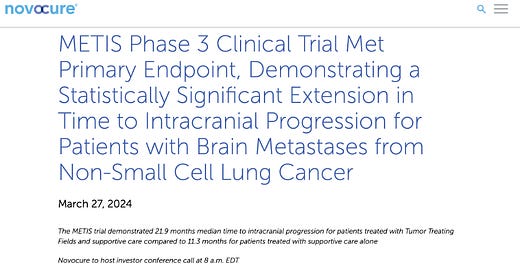Novocure Reports METIS Top Line Clinical Trial Results for Brain Metastases from NSCLC
Promising, but we will wait for the full data presentation
Today, Novocure (Nasdaq: NVCR) reported top line results for the Phase 3 METIS clinical trial of Optune® Tumor Treating Fields (TTF) for the treatment of brain metastases associated with NSCLC (see here; NCT02831959). The headline was that the Primary Endpoint of median Time to Intracranial Progression (mTICP) demonstrated an improvement of mTICP to 21.9 months for patients treated with TTF + Supportive Care compared to an mTICP of 11.3 months for patients treated with Supportive Care alone (N=298; hazard ratio=0.67; p=0.016). Median TTF treatment duration was only 16 weeks in the study.
The Secondary Endpoints included the more important mOS endpoint as well as Time to Neurocognitive Failure and Radiological Response Rate, and were not reported to have attained statistical significance yet.
According to the Company, “preliminary analyses of key secondary endpoints (time to neurocognitive failure, overall survival, and radiological response rate) did not demonstrate statistical significance. Certain secondary endpoints showed positive trends in favor of treatment with TTFields therapy, including time to distant progression and quality of life. Full analysis of secondary endpoints is ongoing”.
Novocure indicated that it intends to submit the data to Regulatory authorities, and to eventually publish and present the full data in peer-reviewed journals and at medical conferences.
MissionGBM Commentary
Brain metastases (aka “brain mets”) are some of the most challenging sequalae in oncology. It is estimated that up to 20% of all NSCLC patients will experience brain mets with a marked negative impact on mOS and QoL. Current treatment options are sparse and not very effective, and often make the situation worse (e.g. whole brain radiation). Thus, we applaud any forward progress in the development of new treatment options for brain mets. Specifically, Novocure should be commended for its willingness to innovate and conduct risky clinical trials in the area.
It is possible that the label for TTF can be expanded to include treatment of brain mets against an approval endpoint of mTICP (or mPFS) for NSCLC patients. We will let the various Regulatory authorities opine on that point once they review the clinical data and regulatory submission.
However, our attention was drawn to:
Lack of statistical significance on the mOS secondary endpoint; and
The relative short median duration of TTF treatment (16 weeks)
Perhaps, the results for the secondary endpoints will become more compelling as the mOS data matures and is further analyzed.
Investor Perspective. We note that investors have only bid the stock up modestly today in early trading, which is not the typical response one sees following the reporting of transformational clinical data. The current stock price and market capitalization are over 80% below the peak price/capitalization attained following a Jan-2023 press release announcing the top line results for the LUNAR trial of TTF in NSCLC patients (see here). When the full LUNAR trial data were reported at the ASCO meeting in Jun-2023 (see here), NVCR stock plummeted as the reader can see from the nearby stock chart. Further pressure on the stock occurred later in 2023 when additional clinical data were reported. Of course, stock trading is dynamic and prices will fluctuate constantly.
Bottom Line
While we are optimistic about the top line clinical data reported today by Novocure, we will reserve overall judgement until the full clinical data set is presented at a future medical conference or in a refereed journal. Of most interest to us will be the mOS data.





